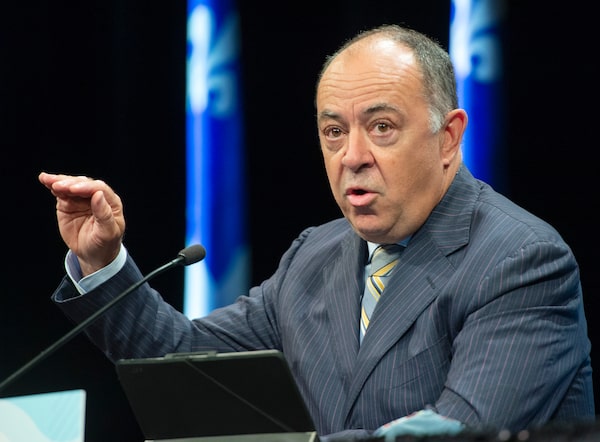
Quebec Health Minister Christian Dube speaks during a news conference in Montreal, on Aug. 10, 2020.Ryan Remiorz/The Canadian Press
Each long-term care home in Quebec will have a single person responsible and accountable for its response to COVID-19, Health Minister Christian Dube said Tuesday as he moved to shore up the vulnerable sector ahead of a potential second wave of the novel coronavirus.
Health-care staff will also be prevented from working in more than one seniors centre and unknowingly carrying the virus into multiple facilities, the health minister said.
Speaking to reporters in Quebec City, Dube said the government was giving itself six weeks to execute the multi-pronged action plan he announced Tuesday that he said will ensure a swifter, more nimble response if cases rise again.
Many of the measures to be put in place by the end of September are aimed at avoiding a second disaster in the long-term care sector, which accounted for the bulk of the province’s 5,727 deaths attributed the virus.
A key component of the plan is to name a manager who will lead each of the province’s roughly 400 long-term care homes. Quebec Premier Francois Legault has said that at the beginning of the pandemic, one person was often responsible for multiple long-term care facilities, creating confusion and diffusing accountability.
The new managers, who will each be assisted by an infection-control specialist, will be responsible for ensuring government directives are followed. “I don’t want any more excuses that it’s not clear,” Dube said.
He promised that managers who do not follow directions would face consequences, although he did not say what they would be.
Dube stressed that the existing managers of long-term care homes were not responsible for the failures of the first wave, which exposed the weaknesses of a system he described as fragile and under-resourced.
Rather, he said, many managers were unable to respond to the pandemic due to a combination of staff shortages, lack of training and infection control, and directives that were unevenly applied, all of which he expects the new plan to address.
“The elected officials as well as the managers will be accountable,” he said. “But what we want to do with the action plan, with the amounts we’re talking about, is to have managers and elected officials to work with the right tools.”
Dube’s strategy also includes rapid mass testing, maintaining access to surgeries, and ensuring the province has enough medical equipment to cover a potential second wave.
“With the virus, our best weapon is agility and speed,” he said.
Dube also announced an additional $106 million for public health, which will allow regional health establishments to hire some 1,000 full-time workers to help with contact tracing, infection control and administering an eventual vaccine.
The government has already hired 10,000 orderlies, who are expected to enter the work force in the next few weeks.
Seniors Minister Marguerite Blais said Tuesday many of the elements of the action plan will have a lasting positive effect on the long-term care sector. She said the government will present a longer-term policy on the seniors facilities this fall.
Meanwhile, Quebec reported on Tuesday 46 new COVID-19 cases and six additional deaths linked to the novel coronavirus.
The number of hospitalizations remained unchanged at 145 while the number of people in intensive care increased by two to 27.
Quebec has been by far the hardest-hit Canadian province, with 61,252 COVID-19 infections since the beginning of the pandemic.
While new cases have been declining in recent weeks, Dube warned the virus is still circulating in the province.
He said the current “period of calm” was not a sign the virus was gone, but rather a chance to prepare for a likely rise in infections in the fall.
Dube said Quebec has successfully contained recent outbreaks, suggesting the province is better prepared to move quickly if a second wave comes.
Sign up for the Coronavirus Update newsletter to read the day’s essential coronavirus news, features and explainers written by Globe reporters and editors.